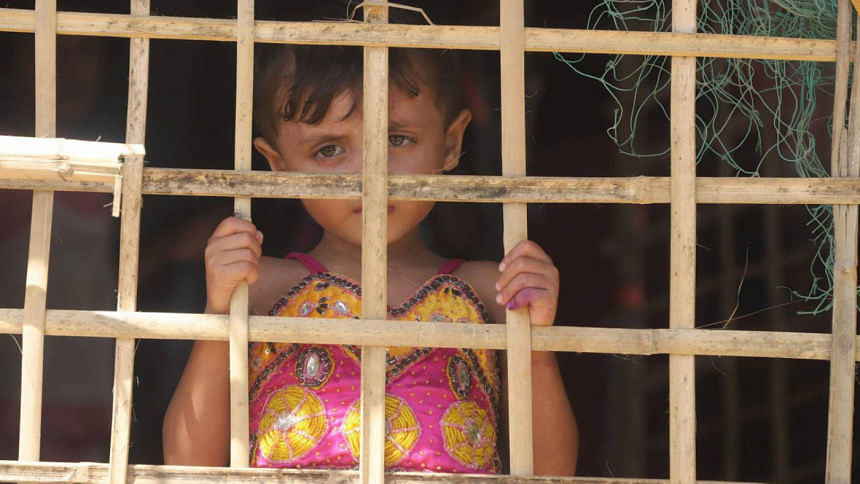What does Bangladesh want from her friends?

The ongoing ethnic cleansing of Rohingyas in Rakhine State by the military and security forces of Myanmar has caused over half a million of them to flee and take refuge in Bangladesh. Consequently, an enormous burden of some one million Rohingyas, including the remainder from past influxes, has been foisted on Bangladesh by her immediate neighbour. If it has to be borne for long, the burden could prove a real drain on this small country's public exchequer, and could have serious social, security, environmental and other implications.
Bamars constitute Myanmar's dominant and majority ethnic community. Buddhists by faith, they detest Rohingyas; not just because they belong to religions different from theirs (majority of Rohingyas are Muslims and the rest Hindus), but also because of their dark complexion. So, we are witnessing communalism and a replay of apartheid in Rakhine which the world had seen earlier in South Africa when whites ruled that country.
The ruling junta rendered Rohingyas stateless by abrogating their citizenship in 1982. They have no freedom of movement within the country and are deprived of state education and jobs in the civil service. Consequently, Rohingyas have become a largely illiterate and pitiably impoverished minority. The racist, communalist and ultra-nationalist elements among the Buddhist population want to either annihilate them or see them leave Myanmar for good, despite the fact that Rohingyas have been living in Rakhine since the 8th century.
In their bid to distort history, Myanmar authorities have ceased to call them "Rohingyas", and are calling them "the Muslim community in Rakhine" instead. They are turning a blind eye to the fact that historically, Rohingyas belonged to "a community that developed from people of various lines of descent, including Myanmarese, Arabs, Moors, Persians, Bengalis and others". Nobody among the living generations of the Rohingyas was born in Bangladesh. They were born in Myanmar and grew up there as offspring of that soil.
Myanmar is also running a misinformation campaign about how the ongoing crisis began and their response to it to deflect the mounting international pressure.
Unfortunately, in her efforts to find a rapid and durable solution to the problem, Bangladesh is not getting the support of some of her traditionally close friends, namely China, India, Russia and Japan with whom she has deep and extensive trade and economic ties as well as cooperation in international forums and organisations. Their relief materials for Rohingyas apart, they have by and large sided with Myanmar authorities; in other words, with the persecutor and not with Bangladesh that has provided shelter to the persecuted Rohingyas.
Friendship, especially long-standing friendship, engenders among friends some mutual rights and expectations. People expect friends to stand by them in times of need. Naturally, Bangladesh expects China, India, Russia, Japan and its other friends to firmly stand by her and help find a durable solution to the Rohingya crisis that has been plaguing Bangladesh since the late 1970s.
Standing by Bangladesh does not necessarily mean abandoning Myanmar. In fact, Bangladesh also considers Myanmar a friendly neighbour with whom she enjoys common membership in some regional organisations. The only problem is that the simmering persecution of Rohingyas in Rakhine intermittently flares up into unspeakable atrocities, thus triggering massive waves of exodus of Rohingyas; with hundreds of thousands of them fleeing to Bangladesh for refuge. The latest exodus, termed as "a textbook case of ethnic cleansing" by the UN and "genocidal" by some others, began on August 25, (2017) and is not stopping despite mounting international condemnation of the Myanmar authorities, and the fact that they sent out a minister to Bangladesh to discuss repatriation of their nationals.
As a major power, China is assuming global responsibility. Its current leadership's vision for a stable, peaceful and prosperous world embodies that responsibility. That vision also pervades China's numerous initiatives in the international arena, like the BRI (the Belt and Road Initiative), the AIIB, BRICS Bank, SCO, CICA (Conference on Interaction and Confidence Building Measures in Asia) and so on. The noble goals of that vision cannot be achieved if there exist forces of instability, persecution, racism, and the likes of those in the region.
Bangladesh considers China and India amongst her closest friends and development partners with intensive and cooperative bilateral relations. To further deepen mutual trust, Bangladesh addressed all the anxieties and interests of India in Bangladesh to India's satisfaction. On the other hand, Bangladesh always remembers with gratitude Russia's (the then Soviet Union's) invaluable support during her Liberation War, along with India's. Russia still has very momentous defence and technological cooperation with Bangladesh. Japan too has always been a major trade, economic and development partner. Being common friends of Bangladesh and Myanmar, they can help Bangladesh find a durable solution to this dire humanitarian crisis once and for all by using their leverage and good offices with Myanmar.
Bangladesh has shown her appreciation of the US, the UK, France, Turkey, Egypt, EU, OIC, and other countries and the international community at large as well as the Secretary General of the UN, for their firm stance against the ongoing atrocities on the Rohingyas.
China, India, Japan, Russia and ASEAN countries that have well-established ties of friendship and cooperation with Myanmar can persuade it to immediately create a congenial situation in Rakhine to enable the Rohingyas to return to their homeland in safety and security. The Myanmar government must also make reparations and rebuild their houses; and restore their citizenship in line with the Kofi Annan Commission's recommendation and also implement its other recommendations so that the Rohingyas can live with dignity and in peace.
Under mounting international pressure, Myanmar is apparently taking steps (or it could be just eyewash to ward off international community's criticism) to repatriate their nationals from Bangladesh after verification. Judging from our past experiences, we apprehend that Myanmar will make the verification process drag on for years on end; and thus, effectively block the repatriation process on the pretext of non-possession of any documents issued by the Myanmar authorities. Hardly any of the Rohingya refugees in Bangladesh were issued identity cards by Myanmar. And even if some of them had documents to prove their birth and living in Myanmar, have they been able to carry those with them while running for their lives and fleeing to Bangladesh in the face of rampant killings, rape, physical torture, and arson attacks on their houses? Under the circumstances, the registration of the refugees upon their arrival in Bangladesh by the UN organisations and Bangladesh authorities must be accepted as proof that they came from Myanmar. Moreover, the whole world witnessed their mass exodus from Myanmar and arrival in Bangladesh on television, while satellite images showed their charred villages.
The Myanmar authorities have used the "terrorist attacks" on some police posts in Rakhine as a pretext to launch a massive crackdown on innocent and unarmed Rohingyas. If the issue is not resolved shortly, the region might witness advent of a new front for international terror groups. That won't be good for anybody, of course.
The friends of Bangladesh need to drive it home to Myanmar that communalism, racism, religious fanaticism, and savagery, etc, are indeed anachronisms in the world of the 21st century.
Muhammad Azizul Haque is former ambassador and secretary.





Comments